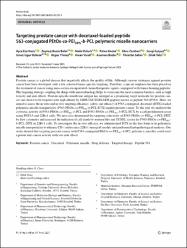Targeting prostate cancer with docetaxel-loaded peptide 563-conjugated PEtOx-co-PEI30%-b-PCL polymeric micelle nanocarriers

Erişim
info:eu-repo/semantics/embargoedAccessTarih
2023Yazar
Nezir, Ayca EceBolat, Zeynep Busra
Ozturk, Naile
Kocak, Polen
Zemheri, Ebru
Gulyuz, Sevgi
Özköse, Umut Uğur
Yilmaz, Ozgur
Vural, Imran
Bozkır, Asuman
Şahin, Fikrettin
Telci, Dilek
Üst veri
Tüm öğe kaydını gösterKünye
Nezir, A. E., Bolat, Z. B., Ozturk, N., Kocak, P., Zemheri, E., Gulyuz, S., ... & Telci, D. (2023). Targeting prostate cancer with docetaxel-loaded peptide 563-conjugated PEtOx-co-PEI30%-b-PCL polymeric micelle nanocarriers. Amino Acids, p.1-15.Özet
Prostate cancer is a global disease that negatively affects the quality of life. Although various strategies against prostate cancer have been developed, only a few achieved tumor-specific targeting. Therefore, a special emphasis has been placed on the treatment of cancer using nano-carrier-encapsulated chemotherapeutic agents conjugated with tumor-homing peptides. The targeting strategy coupling the drugs with nanotechnology helps to overcome the most common barriers, such as high toxicity and side effects. Prostate-specific membrane antigen has emerged as a promising target molecule for prostate cancer and shown to be targeted with high affinity by GRFLTGGTGRLLRIS peptide known as peptide 563 (P563). Here, we aimed to assess the in vitro and in vivo targeting efficiency, safety, and efficacy of P563-conjugated, docetaxel (DTX)-loaded polymeric micelle nanoparticles (P563-PEtOx-co-PEI30%-b-PCL-DTX) against prostate cancer. To this end, we analyzed the cytotoxic activity of P563-PEtOx-co-PEI30%-b-PCL and P563-PEtOx-co-PEI30%-b-PCL-DTX by a cell proliferation assay using PNT1A and 22Rv1 cells. We have also determined the targeting selectivity of P563-PEtOx-co-PEI30%-b-PCL-FITC by flow cytometry and assessed the induction of cell death by western blot and TUNEL assays for P563-PEtOx-co-PEI30%-b-PCL-DTX in 22Rv1 cells. To investigate the in vivo efficacy, we administered DTX in the free form or in polymeric micelle nanoparticles to athymic CD-1 nu/nu mice 22Rv1 xenograft models and performed histopathological analyses. Our study showed that targeting prostate cancer with P563-conjugated PEtOx-co-PEI30%-b-PCL polymeric micelles could exert a potent anti-cancer activity with low side effects.
















